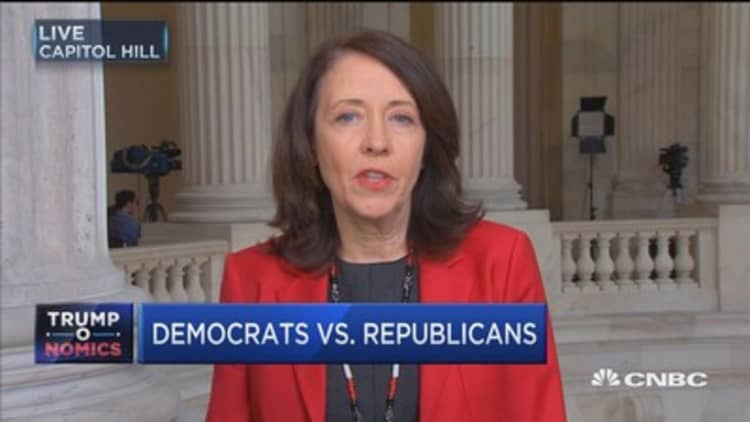
A draft copy of the secret Republican Senate bill that would overhaul Obamacare is expected to be released online at 11 a.m. ET Thursday, less than two hours after many GOP senators get to see if for the first time.
Even some of the senators who were reportedly part of a group tasked with writing it, including Mike Lee of Utah, had not seen its details.
However, several reports published Wednesday provide some outline of what is expected to be in the draft copy, which GOP leaders hope to vote on next week.
The bill is expected to make reductions in the federal government subsidies for the purchase of individual health plans — the kind of private insurance available to people who don't get health coverage through a job. It is also expected to ramp down Medicaid spending, undo a series of Obamacare taxes and end the requirement that most Americans have some form of health coverage or pay a fine.
GOP leadership has been working on the Senate bill for almost two months, after their counterparts in the House barely managed to win passage of their own health-care reform bill, the American Health Care Act. It remains to be seen how different, or how similar, the Senate version is to the deeply unpopular House legislation.
The 52 GOP senators, who do not expect to get any support in passing their bill from either the 46 Democratic senators or two independents, are scheduled to meet at 9:30 a.m. to see the draft bill. Republican leaders can afford to lose votes from just two of the senators in their caucus if they hope to win passage.
That may be difficult because details in the bill that may please moderate Republicans, such as lengthening the time to phase out enhanced Medicaid funding, will displease conservatives. On the other hand, if the bill does not bar use of Medicaid benefits at Planned Parenthood clinics, conservatives may refuse to vote for it.
The bill's details still are subject to change, particularly because of the strict rules around the process of reconciliation that Senate Republicans hope to use to pass the bill with just 50 votes. Normally, 60 votes are needed to overcome an opposition filibuster.
Politico and Axios reported that one sticking point is how to replace Obamacare's program of providing financial aid to help most customers pay their monthly insurance premiums with another subsidy mechanism.
A key question is whether the GOP bill will be able to offer financial aid for purchasing individual health plans while at the same time ban that aid from being used to buy plans that cover abortions.
Axios said Senate aides do not believe they will be able to tie the anti-abortion restriction onto the new subsidy structure, and that a backup plan is to reduce the existing amount of financial aid given Obamacare customers.
The Washington Post said a draft of the bill would reduce the maximum amount of money people could earn to qualify for individual plan premium subsidies from 400 percent of the federal poverty level to 350 percent. However, the Post reported that the bill would allow anyone who earns below that new level to get subsidies if they are not eligible for Medicaid, the government-run health coverage program for the poor.
Under Obamacare now, no one who earns below 100 percent of poverty can get a subsidy for a private individual health plan.
The Post also reported that the current draft would repeal all Obamacare taxes, with the exception of the "Cadillac Tax," which imposes a surcharge on expensive health plans.
Politico reported that the Senate bill would repeal the Affordable Care Act's requirement that most Americans have some form of health coverage or pay a fine, and another requirement that large employers offer coverage to workers or pay a penalty.
Politico also said the bill would set a four-year schedule for rolling back enhanced spending that states receive to expand their Medicaid programs under the ACA, as opposed to a three-year phase-out.

The bill would make cost-sharing subsidies that currently help low-income Obamacare customers pay for their out-of-pocket health expenses subject to an annual vote by Congress, requiring a 60-vote threshold in the Senate.
Axios said the bill probably will not include a controversial provision that had been in the House version, which would have allowed states to obtain waivers that would let insurers not offer certain essential health benefits to customers and to let them charge sicker people higher premiums.
However, the bill also is expected to loosen restrictions on granting states so-called 1322 waivers, which would allow them to create their own sets of health-insurance rules. Loosening 1332 rules could result in states obtaining the same sorts of waivers they would have received under the House bill.
GOP leaders in the House, who labored for weeks to pass their bill, won approval by just a single "yes" vote. That bill, known as the American Health Care Act, is broadly unpopular, and was estimated by the Congressional Budget Office to result in the loss of health insurance for 23 million people.
Because of that, Senate GOP leaders have drafted their own version in secret. They do not plan on holding committee hearings on it, denying Democrats a chance to criticize the bill and expose possible problems with it.
The CBO is expected to issue estimates of the impacts of the Senate bill early next week. Republican leaders want a vote on the bill by late next week, before the Fourth of July recess.
Watch: Keep buying health care stocks



